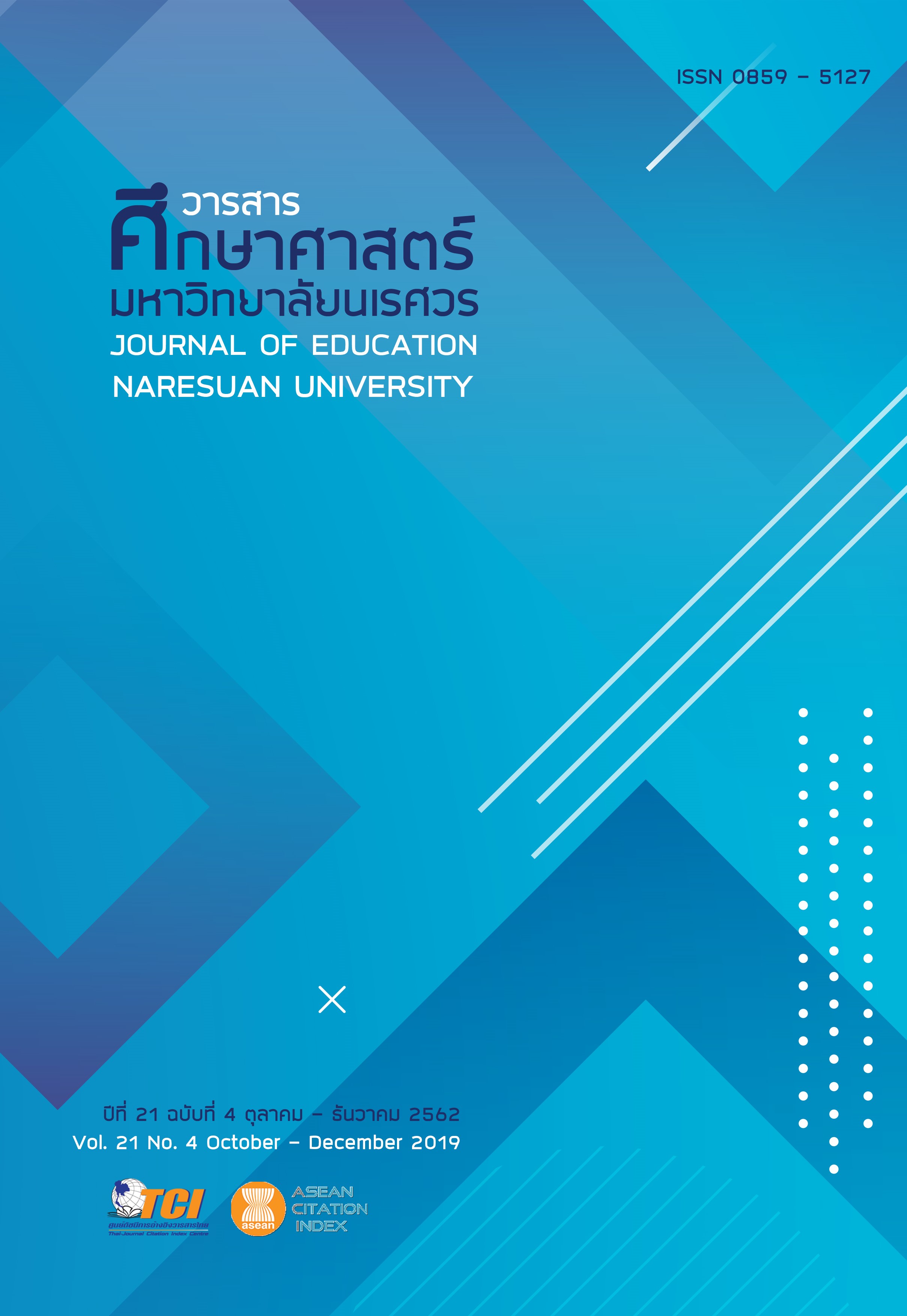ผลการจัดการเรียนรู้ด้วยกระบวนการรับใช้สังคมที่เสริมสร้างจิตสาธารณะของนักเรียนชุมนุมจิตสาธารณะ (RESULTS OF LEARNING MANAGEMENT WITH SOCIAL LEARNING PROCESS TO ENHANCE PUBLIC MIND OF PUBLIC MIND CLUB STUDENTS)
Main Article Content
บทคัดย่อ
การวิจัยครั้งนี้มีจุดมุ่งหมายเพื่อศึกษาพัฒนาการด้านจิตสาธารณะหลังเรียนด้วยการจัดการเรียนรู้ด้วยกระบวนการรับใช้สังคม และเปรียบเทียบจิตสาธารณะหลังเรียนกับเกณฑ์ร้อยละ 70 กลุ่มเป้าหมาย คือ นักเรียนชุมนุมจิตสาธารณะ ชั้นมัธยมศึกษาปีที่ 3 โรงเรียนบางมูลนากภูมิวิทยาคม อำเภอบางมูลนาก จังหวัดพิจิตร จำนวน 30 คน เครื่องมือที่ใช้ในการวิจัย ประกอบด้วย แผนการจัดการเรียนรู้จำนวน 4 แผน แบบสังเกตพฤติกรรมด้านจิตสาธารณะ และแบบเขียนรายงานตนเอง ดำเนินการวิจัยโดยการจัดกิจกรรมการเรียนรู้ด้วยกระบวนการรับใช้สังคม ใช้เวลา 5 สัปดาห์ สัปดาห์ละ 2-3 ชั่วโมง รวม 14 ชั่วโมง สังเกตพฤติกรรมด้านจิตสาธารณะ และให้นักเรียนเขียนแบบรายงานตนเอง วิเคราะห์ข้อมูลโดยใช้สถิติค่าเฉลี่ย () ส่วนเบี่ยงเบนมาตรฐาน (S.D.) สถิติ t-test (one sample test) และการวิเคราะห์เนื้อหา (Content Analysis) ผลการวิจัย พบว่า
1. นักเรียนมีพัฒนาการด้านจิตสาธารณะหลังเรียนด้วยการจัดการเรียนรู้ด้วยกระบวนการรับใช้สังคม จากการสังเกตครั้งที่ 1 โดยรวมอยู่ในขั้นการเห็นคุณค่า ( = 3.31, S.D. = 0.67) และจากการสังเกตครั้งที่ 2 โดยรวมอยู่ในขั้นการพัฒนาเป็นลักษณะนิสัย (
= 4.53, S.D. = 0.53)
2. นักเรียนที่เรียนด้วยการจัดการเรียนรู้ด้วยกระบวนการรับใช้สังคม มีจิตสาธารณะหลังเรียน สูงกว่าเกณฑ์ของร้อยละ 70 อย่างมีนัยสำคัญทางสถิติที่ ระดับ .01
RESULTS OF LEARNING MANAGEMENT WITH SOCIAL LEARNING PROCESS TO ENHANCE PUBLIC MIND OF PUBLIC MIND CLUB STUDENTS
The purposes of this research were to study the public mind development and to compare students’ public mind after learning through service learning process with 70 percentage criterion. Target of 30 Public Mind Club were studying in grade 9 students of Bangmunnakphoomiwitthayakhom School, Bangmunnak District, Phichit Province. The instruments used in the study were 4 lesson plans, Public mind observation from and the self – report. The study was conducted through learning management for 5 weeks, 3-4 hours a week, totally 14 hours. The data were analyzed by using mean (), standard deviation (S.D.), t-test (one sample test) and Content Analysis.
1. The results revealed that the students public mind through Service learning Process step of Valuing ( = 3.31, S.D. = 0.67) for the first observation and step of Characterization (
= 4.53, S.D. = 0.53).
2. The results of students behavior on public mind for the second observation was higher than the 70 percentage with the criterion at the .01.
Article Details
เจ้าของบทความมิได้คัดลอก หรือละเมิดลิขสิทธิ์ของผู้ใด หากเกิดการละเมิดลิขสิทธิ์ ไม่ว่าวิธีใด หรือการฟ้องร้องไม่ว่ากรณีใด ๆ ที่อาจเกิดขึ้นได้ กองบรรณาธิการวารสารศึกษาศาสตร์ ไม่มีส่วนเกี่ยวข้องทั้งสิ้น ให้เป็นสิทธิ์ของเจ้าของบทความที่จะดำเนินการ
เอกสารอ้างอิง
2. Chuayprom, S., & Kaewurai, W. (2016). A development of activities model to enhance public mind through service learning for elementary students. Lampang Rajabhat University Journal, 5(2), 133-146. [in Thai]
3. Chungphisud, S. (2001). Public consciousness. Art and culture, 22(9), 22 – 23. [in Thai]
4. Dewey, J. (1962). Democracy and education. Boston: Houghton Miffin.
5. Kasemnat, L., et al. (2003). Primary students development model have a public mind: Long-term study. Bangkok: Srinakharinwirot University. [in Thai]
6. Khammani, T. (2008). Science teaching: Knowledge for the learning process effective. Bangkok: Chulalongkorn University Press. [in Thai]
7. Kolb, D. A. (1984). Experiential learning: Experience as the source of learning and development. Englewood Cliffs, N.J.: Prentice-Hall.
8. Ministry of Education. (2008). The basic education core curriculum 2008. Bangkok: Printing Agricultural Cooperative Federation of Thailand. [in Thai]
9. Singhapol, S. (1999). Must teach new consciousness. Srimajan, 13(27), 15-16. [in Thai]
10. Sutthirat, C. (2014). Teach children to nave public mind. Bangkok: V-print. [in Thai]
11. Taitorphon, W., Sawagpun, P., Kaewurai, W., & Wattanatorn, A. (2015). The development of enrichment curriculum to enhance public mind through social cognitive theory and service learning for lower secondary school students. Journal of Education Naresuan University, 17(2), 1-12. [in Thai]
12. Tonsricharoen, N. (2003). Service learning: Learning from social help. Reform, 6(62), 23-26. [in Thai]
13. Vechayant, C. (2001). A development of instructional design using service learning technique for enhancing social service awareness, problem solving skill and learning achievement of lower secondary school students (Doctoral dissertation). Bangkok: Chulalongkorn University. [in Thai]


